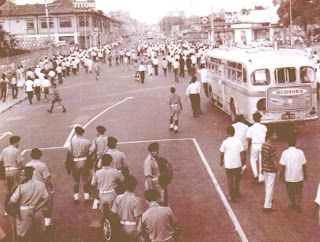Q & A
Singapore is a multi-ethnic society and there are many different races and religion.
2) What are the challenges of multi-ethnicity in Singapore? (Oscar)
In a multi-ethinic society like singapore, issues such as race and religion can be used to cause conflict among the different groups. How these can issues are handled is crucial in ensuring that harmony is maintained.
Racial Issues
- What were the events that led to the race riots of 1964?(Marianne)
This was worsened in 1964 when the People's Action Party(PAP) participated in the Federal Election of Malaysia. The PAP promised a non-communal approach to Malaysian politics and the creation of a Malaysia where everyone had equal rights and privileges. This made the Malays in the United Malays National Organisation(UMNO) feel threatened as they took it as Singapore's first attempt to have a share in the affairs of Malaysia.
Some of the UMNO leaders organised an anti-PAP campaign so as to highlighted the poverty of the Malays in Singapore. In addition, the PAP's resettlement and redevelopment programme was portrayed as anti-Malay. The UMNO accused the PAP for uprooting the Malays from their homes in the traditional Malay areas during the resettlement programme, even though the Chinese residents were affected as well. This was done to arouse feelings of dissatisfaction among the Singapore Malays towards the PAP.
The UMNO used the Malay newspaper, Utasan Melayu to spread the anti-PAP campaign by claiming that 3000 Malay families were affected by the resettlement programme when in reality, only about 200 out of the 2500 families resettled were Malays. It also claimed that the PAP government did not care for the Malays in Singapore.
In July, the UMNO had a speech with the Malays and portrayed the PAP as anti-Malay, which made the Malays very angry. Later on, the government called for a meeting with Malay organisations to explain its policies and promised the Malays that their economic and social positions would be improved through education and training. However, the Malays were still angry and planned a race riot.
- What were the causes of the race riots?(Marianne)
The causes were the UMNO's spiteful speeches of the PAP and the bias as well as irresponsible newspaper articles.
- What happened during the race riots?(WEIREN)
In July 1964, during Prophet Muhammad's birthday celebration, a fight between a Chinese policeman and a group of Malay participants of the procession, turned into a full-blown race riots over the next few days.
Efforts were made to call for calm. Goodwill Committees were also formed to help foster stronger bonds among the people from different races and religions. Committee members went from house to house to spread the message of living peacefully with one another.
.jpg)
- What were the consequences of the race riots?(weiren)
The race riots caused damage to property as well as loss of lives, 36 people dead and 560 others injured.
- Why do people react sensitively to race issues?(Marianne)
Because this is a very emotional and volatile subject.
- What were the lessons learnt from the riot?(Marianne)
Never trust bias information about other governments unless you know the what is truth and what is not
- Why do people react sensitively to religious issues ?(Oscar)
Because some religious issues can be quite insulting & it can be offending at times. Different people have different kind of thinking or thoughts towards religious issues. Thus, some people will react sensitively towards religious issues.
- How issues relating to transnational terrorism could divide the people.(Oscar)
transnational terrorism refers to acts of violence which are global in terms of aims, organisation and impact. These acts can test the social bonds of the people in Singapore. Singapore needs to handle this threat carefully as it can divide the people. in multi-ethnic societies like Singapore, race and religion may be used to create ill feelings among the different ethnic groups. This can, in turn threaten racial and religious harmony in the country.

0 Comments:
Post a Comment
Subscribe to Post Comments [Atom]
<< Home